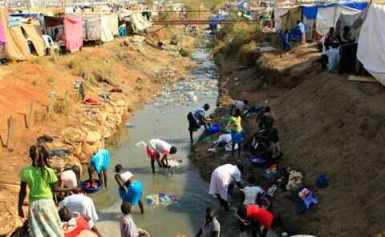MSF responds to poor medical conditions in Juba camps
March 7, 2014 (JUBA) – Medecins Sans Frontieres (MSF) says it is providing medical care for up to 40,000 displaced people sheltering at two camps in the South Sudan capital, Juba, where political tensions erupted into a full-scale conflict late last year.

However, there are now plans to move some of the residents to a third camp with better conditions to ease overcrowding at existing sites.
MSF, which has in-patient facilities at both sites with a total 50-bed capacity, also carries out around 1,600 consultations per week at the two camps, mainly for diarrheal diseases, malnutrition and respiratory tract infections.
Living conditions in the Tomping camp remain extremely poor, with overcrowding and poor sanitation among the most pressing concerns. More than 50 people must share the same latrine, which is above the emergency threshold standard for such a setting.
With the rainy season due to start at the end of March, MSF says unless residents are moved to a less crowded facility with better drainage, the risk of a spike in Diarrhoeal diseases and malaria is extremely high.
Flooding in already overcrowded camps would make the situation untenable for camp residents, many of whom are too fearful of being attacked if they were to return home.
VOICES FROM TOMGPING
On 16 December, the morning after heavy gunfire shook her house in Juba’s the Kor William area, Mary Michael gave birth to a son. Although she was still extremely weak, Michael fled on foot with her five-hour-old baby and seven other children.
“All my neighbours were taking off … I couldn’t live with the fear of my children being exposed to more danger,” she said.
She has no news about her husband’s whereabouts and doctors have told her that her five-year-old son is suffering from a skin infection and malnutrition.
“He does not eat and complains of stomach ache. We are very many in the camp and I don’t know what disease my child has contracted from others,” Michael said.
“I have no idea about the future of the country, fights are still going on, and some of us are being innocently killed by the fighting,” she adds.
Mother-of-three Mary Nyakan also arrived at the Tomping camp on 16 December. Her two-year-old son Simon Malek was admitted to MSF’s clinic two weeks ago and is suffering from pneumonia and malnutrition associated with watery diarrhoea.
Nyakan says ongoing killings and looting left her with no choice but to flee, however, life in the camp remains difficult due to the lack of food, as well as poor water and sanitation.
“We are exposed to very poor conditions and I think that is why our children are becoming very sick. We only get food like beans, flour, rice and packed porridge which is just for survival. There is not enough space and no proper shelter. I pray to God that he brings peace and has mercy upon us who are suffering. The leaders who are fighting should end the fight so that we can go back to our homes,” she said.
Mam Pal came to the Tongping camp on 17 December, without any belongings. She gave birth at the MSF clinic on 14 January, where she has remained until now.
“Since I gave birth I am very weak. My breast milk is not enough for my baby, Nyabos Deng Nyal, who is now under treatment for malnutrition. The living conditions here are very poor, but I won’t go back home,” she said.
More than 10,000 people are estimated to have died in the conflict, which has displaced about 900,000 people, including more than 170,000 people who have fled the country, according to figures from the Office for the UN Office for Coordination of Humanitarian Affairs (OCHA).
(ST)
